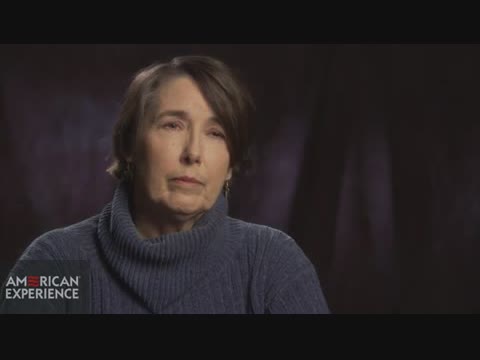American Experience; The Abolitionists; Interview with Joan D. Hedrick, part 1 of 3
- Series
- American Experience
- Episode
- The Abolitionists
- Raw Footage
- Interview with Joan D. Hedrick, part 1 of 3
- Contributing Organization
- WGBH (Boston, Massachusetts)
- AAPB ID
- cpb-aacip-15-2r3nv9b406
If you have more information about this item than what is given here, or if you have concerns about this record, we want to know! Contact us, indicating the AAPB ID (cpb-aacip-15-2r3nv9b406).
- Description
- Description
- Joan D Hedrick is Charles A. Dana Professor of History at Trinity College in Hartford, Connecticut. She is the author of Harriet Beecher Stowe: A Life.
- Topics
- Biography
- History
- Race and Ethnicity
- Subjects
- American history, African Americans, civil rights, racism, abolition
- Rights
- (c) 2013-2017 WGBH Educational Foundation
- Media type
- Moving Image
- Duration
- 00:30:18
- Credits
-
- AAPB Contributor Holdings
-
WGBH
Identifier: cpb-aacip-de0a2652e76 (Filename)
Duration: 0:30:01
-
Identifier: cpb-aacip-c158e66f145 (unknown)
Format: video/mp4
Generation: Proxy
Duration: 00:30:18
If you have a copy of this asset and would like us to add it to our catalog, please contact us.
- Citations
- Chicago: “American Experience; The Abolitionists; Interview with Joan D. Hedrick, part 1 of 3,” WGBH, American Archive of Public Broadcasting (GBH and the Library of Congress), Boston, MA and Washington, DC, accessed December 7, 2025, http://americanarchive.org/catalog/cpb-aacip-15-2r3nv9b406.
- MLA: “American Experience; The Abolitionists; Interview with Joan D. Hedrick, part 1 of 3.” WGBH, American Archive of Public Broadcasting (GBH and the Library of Congress), Boston, MA and Washington, DC. Web. December 7, 2025. <http://americanarchive.org/catalog/cpb-aacip-15-2r3nv9b406>.
- APA: American Experience; The Abolitionists; Interview with Joan D. Hedrick, part 1 of 3. Boston, MA: WGBH, American Archive of Public Broadcasting (GBH and the Library of Congress), Boston, MA and Washington, DC. Retrieved from http://americanarchive.org/catalog/cpb-aacip-15-2r3nv9b406
